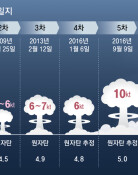Are we okay with a cashless society?
Are we okay with a cashless society?
Posted August. 02, 2024 07:42,
Updated August. 02, 2024 07:42
Bank automated teller machines (ATMs) are disappearing because fewer people are using them, and their fee income is shrinking. Since 2018, 14,426 ATMs have been removed. Recently, a bank in Daegu posted a sign announcing the removal of an ATM, which was covered with handwritten messages from residents, such as 'Please stay' and 'Don't go.'
We are living in an era where it is difficult to withdraw cash or use it. Will cash go extinct? The end of the cash age is already beginning to be seen in many countries around the world.
Australia has been abuzz for the past few months with concerns over the bankruptcy risk of cash transporter Armaguard. With cash usage falling rapidly, the amount of cash on Armaguard's trucks has plummeted, leading to a growing deficit. Armaguard, which handles more than 90% of physical currency transportation, warned late last year that its cash transportation business was unsustainable. If the trucks stopped, cash would become unavailable at banks and ATMs, semi-forcing a shift into a cashless society. Eventually, major Australian banks and big-box retailers provided AUD 50 million in emergency funding to Armaguard, barely averting the crisis.
Cash is not only expensive to issue and transport; it's also inconvenient for giving change. The convenience of digital payments is quickly pushing cash out of the picture. Sweden is one of the world's fastest-moving countries towards a cashless society, thanks to the widespread adoption of the mobile payment service Swish. Buses have long stopped accepting cash, and many shops only accept cards or mobile payments. Many bank branches don't even handle cash, and even if you have a bank account, it's difficult to deposit cash at the teller. The days of 'cash is king' are long gone.
But some countries are trying to prevent its demise. Norway, where only 3% of payments are made in cash, is a prime example. The country recently amended its Financial Contracts Act to recognize consumers' right to pay in cash. This means that all stores, except vending machines or unmanned shops, must accept cash. The law also stipulates that violators can be fined.
Norway, which once aimed to become a 'cashless country by 2030,' reversed course because, even as digital payments become more commonplace, there are still people for whom cash is the only way of paying. These are often vulnerable individuals who don't have access to bank accounts or are not comfortable using digital devices. Additionally, the fact that cash is the only currency that works in an emergency when the power grid and telecommunications networks are down also plays a role.
Even China, the world leader in mobile payment penetration, is turning its attention back to cash. The country sees the difficulty of using cash as a barrier to attracting foreign tourists. This year, the People's Bank of China launched a major crackdown on stores that don’t accept cash. This is an attempt to promote a cash-using environment, a departure from its previous emphasis on a cashless society.
Korea also has legal provisions for the right to pay in cash. Article 48 of the Bank of Korea Act states that 'The Bank of Korea notes issued by the Bank of Korea shall pass as legal tender current freely for all transactions.' However, there are no penalties for violating this, so it's just a declaration. Is cash a public good that should be protected even if it costs money to maintain? It’s time for us to start debating this.
Headline News
- S. Korea, US agree on defense const sharing-plan US presidential election
- Medical school quota discussions spark confusion 40 days before exam
- Zuckerberg surpasses Bezos to become world’s second richest person
- Son excluded from October national team due to thigh injury
- Ruing and opposition leaders launch campaigns ahead of by-election







